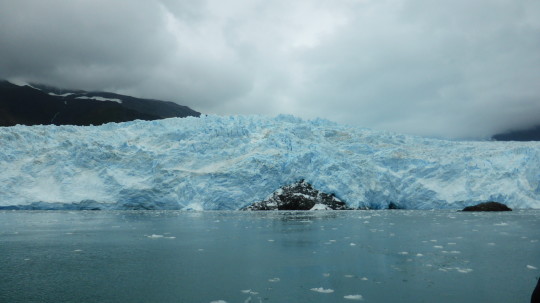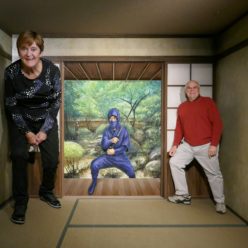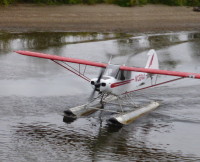The Shortest International Flight, Ever !!!!!
Our flight from Victoria BC to Seattle was the shortest international flight we have ever taken… 25 minutes. It took much longer to get through US immigration and customs than it did to fly to Seattle and we only just made our next flight to Fairbanks, Alaska. A very pleasant 3 1/2 hour flight and we arrived 10 minutes early into Fairbanks, picked up our rental car and drove the 6 miles into downtown and checked into our hotel.
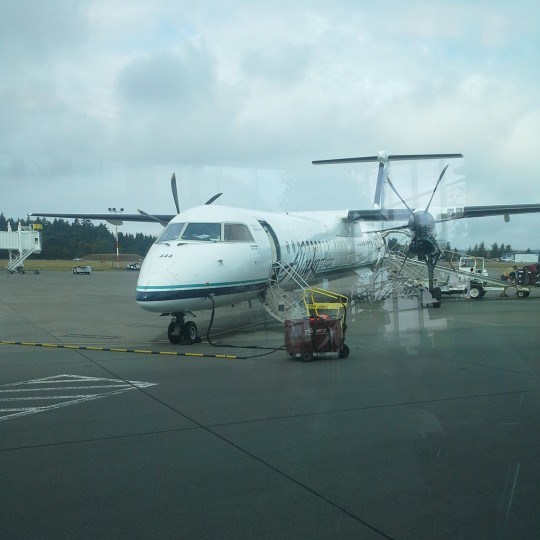
Ye Old Riverboat ….
The next day was a big day. Up early for the Riverboat Discovery tour. A very professional and staged tour down the Chena River. It included a demonstration take off and landing of a float plane, humourous and entertaining commentary, a guided tour of an Athabascan Indian Village as well as sled dog demonstrations.
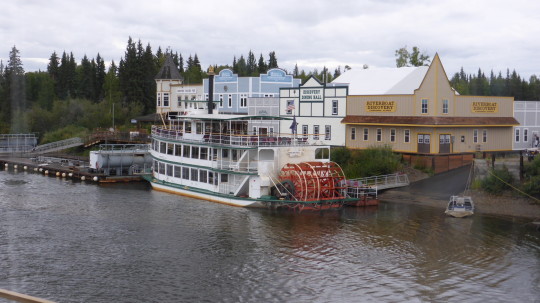
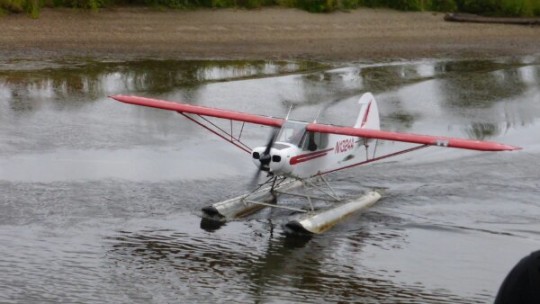
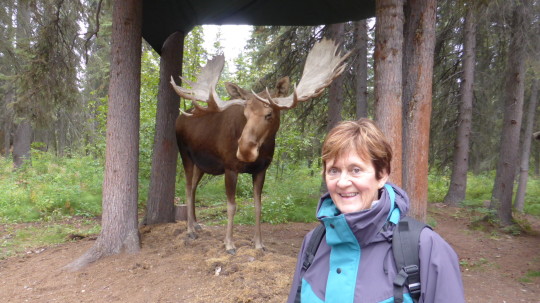
And Then The Museum ….
Our afternoon was spent at the University of Alaska, Museum of the North. It started with a 1 hour personalised tour by two of the staff of the behind the scenes workings of the museum where they store 1.2 million artifacts in an 11,000 sq ft climate controlled warehouse as well as carry out extensive research. It was then up to the theatre for a 30 minute film on the Northern Lights (Aurora Borealis) followed by a very interesting walk around the museum exhibits.
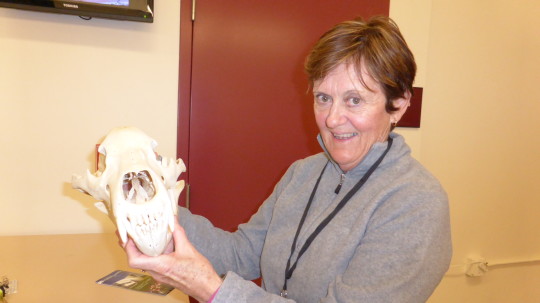
We then viewed two more 30 minute films, one about the museum construction and exhibits and the research carried out at the museum, and the final film was about winter in Fairbanks, Alaska. Some interesting facts about the winter here. Hours of daylight mid summer; 23 hours, mid winter; 2 hours. River freezes and the ice is 3 feet thick. Lowest winter temperature ever recorded; minus 70 degrees F and typical winter temperatures range between minus 40 and minus 60 degrees F. The local primary school has never been closed due to inclement weather. Fairbanks has a lower rainfall than Arizona at an average of 8 inches per year most of which falls as snow.
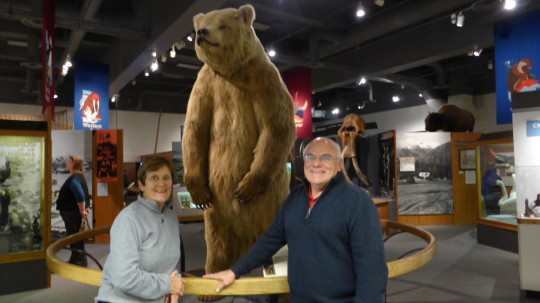
An Interesting Coffee Stop ….
Next day we headed south to Denali National Park. Our stop for coffee was Nenana, 50 miles from Fairbanks. What an interesting place….a native Alaskan river village. The Nenana River flows through the town and each year in March a 26 foot tall timber tripod is dragged out onto the thick river ice and is wired to a clock. For just $2.50 you can guess the exact day, hour and minute as to when the ice will break and stop the clock. People from all over the state and visitors enter the competition. Since 1917 the Nenana Ice Classic has been held and is a direct link to old time Alaska. The prize money can be over $300,000 and the number of entries over 150,000 for a town of 350 people, so of course, we placed our entries. It should happen between April and May next year hopefully.
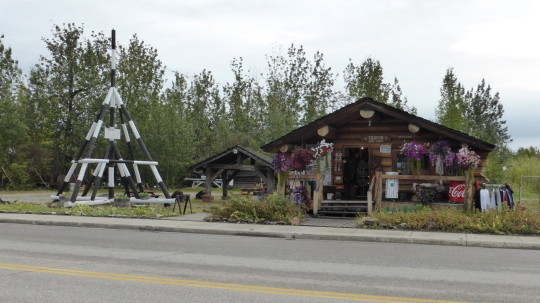
A Day With Everything ….
Our next stop was Denali National Park and the next morning up early for an 8 hour tour into Denali. The weather was overcast so we rugged up ready for rain. What we didnt expect to see was snow in their autumn. It was the first snowfall of the season and was heavy when we were above 3000 feet. The colours of autumn trees and ground foliage covered in snow made such a wonderful sight and experience. We saw bears with their cubs, and caribou heading west preparing for the onset of winter. It was such a great day and will certainly remain a highlight. The town of Denali is naturally filled with the tourist shops which are busy but within 10 days the entire village will be empty. Yes, not one person as it is all closed down for the winter. We had a comfortable two nights at the McKinley Village Lodge before heading further south.
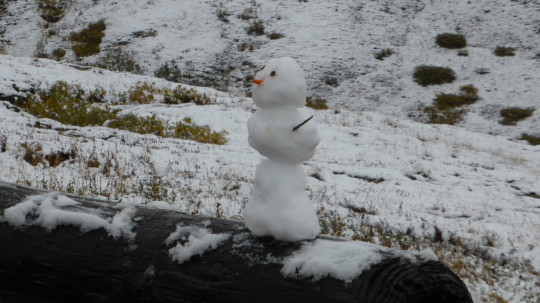
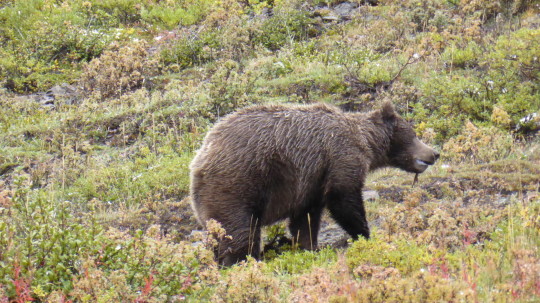
A Short Detour ….
Our next destination was Sheep Mountain Lodge on the Glenn Highway. It is 280 miles from Denali so we had time to call into Talkeetna to see the Alaskan log cabin which is an official symbol of the Alaskan lifestyle. The early settlers who came to Alaska found themselves without a home and built their cabins from whatever trees were available. Talkeetna is somewhat a tourist town with the tourist shops and restaurants. Very interesting news from Talkeetna was that the Mayor of this town is a cat called Stubbs and can be seen outside the General Store most days. Unfortunately in the last couple of days Stubbs has been attacked by a dog and is in a bad way. His accident has been on the news nationally in America.
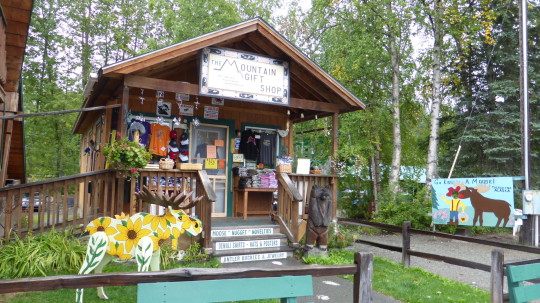
Our First Glacier ….
It was then onto Sheep Mountain and once we turned onto the Glenn Highway the scenery was
spectacular. The Alaska State Fair was in full swing at Palmer running for ten days and finishing the Labour Day long weekend. It was a weekend when all terrain vehicles go off into the bush shooting and camping outdoors. We followed the Matanuska River and each turn saw us looking at mountains, lakes and finally there in front of us was our first glacier…the Matanuska Glacier at the headwaters of the Matanuska River.
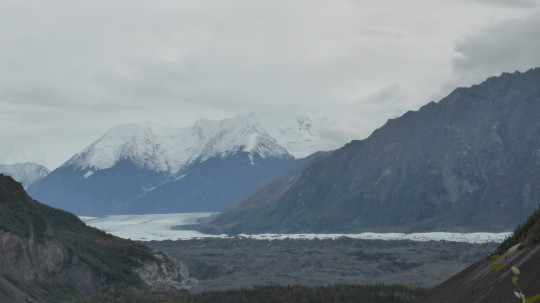
The Matanuska Glacier is the largest glacier in Alaska that can be reached by vehicle. It is approximately 26 miles long and 4 miles wide at its terminus. It is classified as a valley glacier; a body of solid ice that flows like a river under its own weight through a valley. There were lots of opportunities to photograph the glacier which is one of the most dramatic glaciers in Alaska to be seen the highway. We arrived at Sheep Mountain Lodge for a very pleasant night before continuing onto Valdez 190 miles down the road.
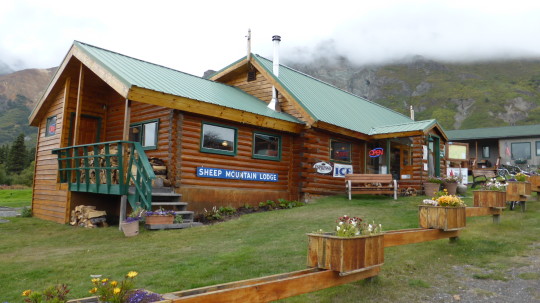
A Change Of Plans ….
The scenery continues to amaze us as well as the weather here. We seemed to be travelling along the ridge of a mountain in sunshine then gradually descended into a valley where the rain started and then going through Thompsons Pass into Valdez either fog or low cloud and it looked like it had set in. On arrival in Valdez we found our hotel, The Mountain Sky, which was very comfortable and with a view of the harbour. Unfortunately the rain stayed with us for the afternoon and all through the night. We were booked on the Alaskan Marine Highway ferry for a 3 hr trip to Whittier but due to the unloading ramp at Whittier needing some maintenance, the ferry was out of service for a week. We then found out that our glacier cruise had been cancelled due to high winds, so we made the decision to leave Valdez a day earlier and drive back to Anchorage. The trip back was so interesting as we left in heavy rain but saw some fantastic waterfalls gushing down the mountains going through Thompsons Pass and once we were clear of the mountains the sun appeared and we saw a different perspective than when we drove into Valdez. So all was good.
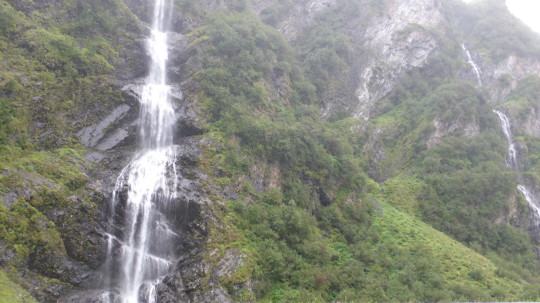
An Animal Rehabilitation, Alaska Style ….
We had an afternoon in Anchorage before leaving the next morning for Seward 125 miles south of Anchorage on the Kenai Peninsula. Along the way we stopped at the Alaska Wildlife Conservation Centre where Alaskan native animals are kept for rehabilitation.
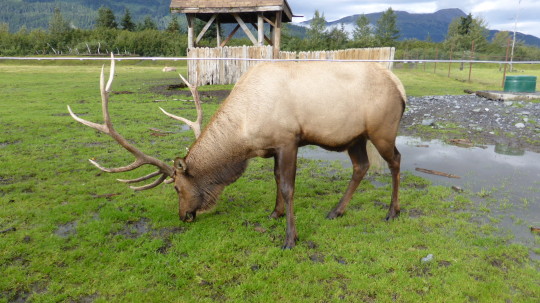
A lot of the animals are permanantly live on site as they are unable to cope back in the wild, so we were able to see, caribou, muskox, bison, moose and elks, but unfortunately the bears were all sleeping.
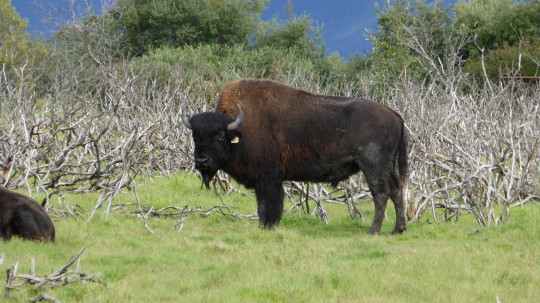
It was then only a short drive into Seward where we were staying at the Windsong Lodge for two nights. Seward is a pretty town right on Ressurection Bay and our afternoon was spent visting the Alaskan Sealife Centre, exploring the town and then a visit to the Exit Glacier 8 miles out of the town.
A Perfect Day …..
We awoke the next morning to a perfect Alaskan summers day. Overcast, with drizzle but with light winds. We had a hearty breakfast of french toast at the local bakery and headed to our cruise boat for the Kenai Fjords National Park cruise. What a fantastic day we had. According to the boat captain it was a perfect summers day in Alaska, equivalent to a cold winters day in Melbourne. During our cruise we saw many birds and mammals. Bald eagles, horned puffin, cormorants, humpbacked whales, sea otters and harbor seals.
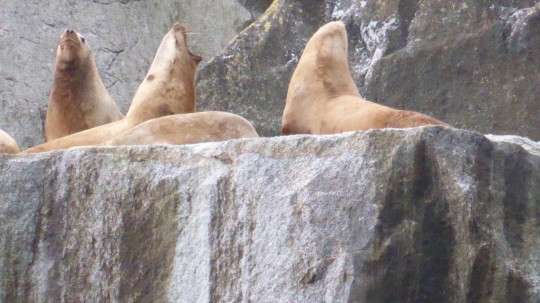
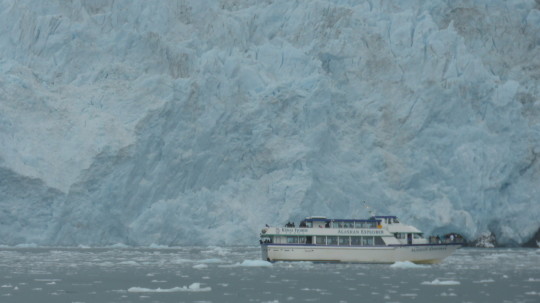
But the absolute highlight was the Aialik Glacier. This glacier measures 1.25 miles wide and 8.0 miles deep before it joins the Harding Ice Field which is 960 sq miles and joins many other glaciers in the national park. Over 90% of this national park is ice. The weather for the day turned out to be really good and we even had some sun but what was interesting was the drop in temperature when we went close up to the glacier. It must have dropped close to 0 degrees Celcius. We had a pleasant drive but wet drive back to Anchorage the next day and all organised for the next leg of our trip. All told we covered 2100 km in 11 days but the driving was easy due to very good roads and courteous Alaskan drivers.
